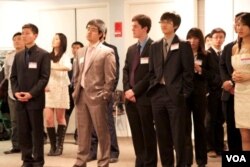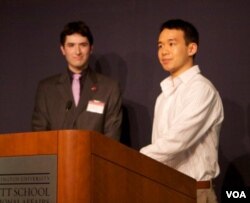At the end of last semester, I was elected president of the Organization of Asian Studies at my university. It’s a pretty cool deal – the school gives us a lot of support to host fun events, like foreign movie nights, happy hours, and special receptions, and we also sponsor speakers to give special talks on Asia-related topics.
All George Washington University students interested in Asian studies are welcome to join, and we attract a pretty even balance of international students and Americans and graduate students and undergrads. Two of our five executive board officers are from Asian countries (Taiwan and South Korea), and three of us are graduate students.
Since we’re about five weeks into our spring semester, and we’ve hosted or co-hosted seven events, I thought I’d share some general thoughts on what it’s been like so far.
Organizing events is like a part-time job:
Even an event as simple as a movie screening takes a surprising amount of effort to put together. We should select our films at least one month in advance in order to allow ourselves enough preparation time, especially if the DVD needs to be shipped from overseas. After that we need to reserve a screening room and projector, make and distribute posters, collect and tabulate RSVPs, order food and drink, set-up and clean-up the room, and finally balance the budget and submit receipts for all of our expenses. Small tasks like this can eat up a lot of time.
Event coordination is fun because I really like working with the other board members, but I definitely spend much more time preparing for events than I actually spend at events. It’s not like last semester when I would just show up to a movie and be able to leave once the credits started rolling.
Paperwork and university regulations can be a burden:
If you want to do anything at my university, there is probably some kind of form you will be required to fill-out. It makes sense, since so many students and professors are always requesting something, but it’s still the biggest hassle for any student org. There is paperwork to reserve rooms, paperwork to be reimbursed for expenses, paperwork to request security services, and so forth.
We also have to receive training and meet with advisors to be briefed on campus rules. Posters need to have university logos printed on them, and they can only be placed at certain locations within certain time frames. Some rooms on campus can only serve food provided by certain catering services. Other rooms require us to receive special training, like on how to use audio equipment and organize seating arrangements, before we are allowed to host an event. The list of procedures goes on and on.
Networking with other organizations has been crucial:
OAS is a pretty new student organization, since the Asian studies center at my university only established it last fall.
Because of this, one of the bigger challenges we’ve faced is how to attract greater membership and student involvement. How do we let other GW students know that we exist?
The fact that there are dozens of Asia-related student organizations on campus makes things more complicated. Some of them are very active, and all of them are geared towards different niches. There’s the club that attracts mostly Chinese international students, for example, but then there’s also the counterpart club that attracts mostly Chinese-American students. Since students tend not to become involved in too many different organizations, even if interest areas sometime overlap, it can be difficult for new groups to get established.
At the same time, being so new to the scene, we’ve depended a lot on networking with other organizations. So far this semester we’ve co-sponsored events with the Hong Kong International Society and the Global China Connection student groups. It’s been an important means of building up awareness of our organization, and it’s a great way to share resources and save money.
The networking aspect is also where being president is so different from my experience last semester. I have to represent the organization at talks and receptions, and I should always be reaching out to other student group leaders.
All of this is pretty awesome to be responsible for though, since I feel like I’m engaging meaningfully with the school community. Meeting new people and making new contacts is fun, and even if the time commitment can be heavy, being involved in a student organization adds important color to my campus life. Even the busywork can be relaxing after I’ve spent a long day in the library and need to take my mind off of coursework.






